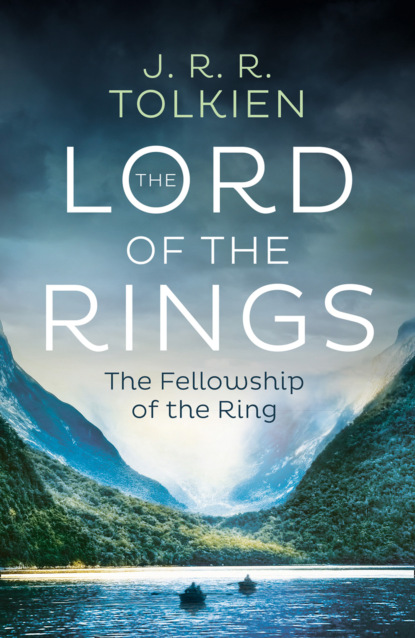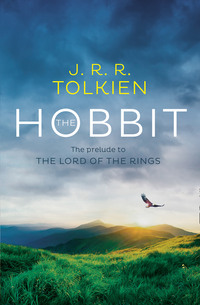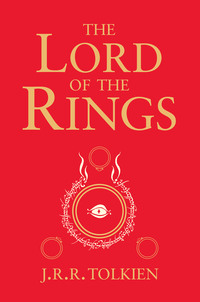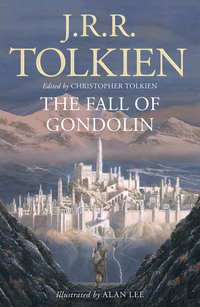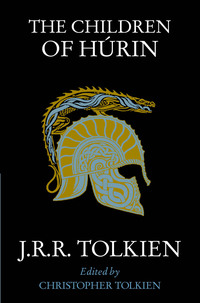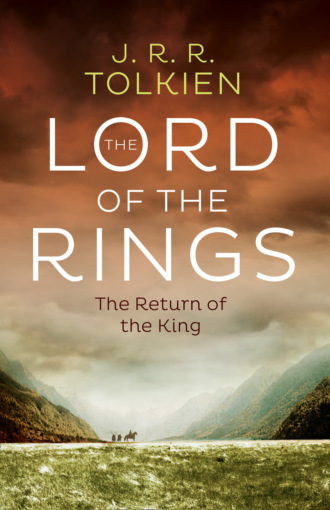
Полная версия
The Return of the King
Then men fell back before the command of his voice and questioned him no further, though they gazed in wonder at the hobbit that sat before him and at the horse that bore him. For the people of the City used horses very little and they were seldom seen in their streets, save only those ridden by the errand-riders of their lord. And they said: ‘Surely that is one of the great steeds of the King of Rohan? Maybe the Rohirrim will come soon to strengthen us.’ But Shadowfax walked proudly up the long winding road.
For the fashion of Minas Tirith was such that it was built on seven levels, each delved into the hill, and about each was set a wall, and in each wall was a gate. But the gates were not set in a line: the Great Gate in the City Wall was at the east point of the circuit, but the next faced half south, and the third half north, and so to and fro upwards; so that the paved way that climbed towards the Citadel turned first this way and then that across the face of the hill. And each time that it passed the line of the Great Gate it went through an arched tunnel, piercing a vast pier of rock whose huge out-thrust bulk divided in two all the circles of the City save the first. For partly in the primeval shaping of the hill, partly by the mighty craft and labour of old, there stood up from the rear of the wide court behind the Gate a towering bastion of stone, its edge sharp as a ship-keel facing east. Up it rose, even to the level of the topmost circle, and there was crowned by a battlement; so that those in the Citadel might, like mariners in a mountainous ship, look from its peak sheer down upon the Gate seven hundred feet below. The entrance to the Citadel also looked eastward, but was delved in the heart of the rock; thence a long lamp-lit slope ran up to the seventh gate. Thus men reached at last the High Court, and the Place of the Fountain before the feet of the White Tower: tall and shapely, fifty fathoms from its base to the pinnacle, where the banner of the Stewards floated a thousand feet above the plain.
A strong citadel it was indeed, and not to be taken by a host of enemies, if there were any within that could hold weapons; unless some foe could come behind and scale the lower skirts of Mindolluin, and so come upon the narrow shoulder that joined the Hill of Guard to the mountain mass. But that shoulder, which rose to the height of the fifth wall, was hedged with great ramparts right up to the precipice that overhung its western end; and in that space stood the houses and domed tombs of bygone kings and lords, for ever silent between the mountain and the tower.
Pippin gazed in growing wonder at the great stone city, vaster and more splendid than anything that he had dreamed of; greater and stronger than Isengard, and far more beautiful. Yet it was in truth falling year by year into decay; and already it lacked half the men that could have dwelt at ease there. In every street they passed some great house or court over whose doors and arched gates were carved many fair letters of strange and ancient shapes: names Pippin guessed of great men and kindreds that had once dwelt there; and yet now they were silent, and no footsteps rang on their wide pavements, nor voice was heard in their halls, nor any face looked out from door or empty window.
At last they came out of shadow to the seventh gate, and the warm sun that shone down beyond the river, as Frodo walked in the glades of Ithilien, glowed here on the smooth walls and rooted pillars, and the great arch with keystone carven in the likeness of a crowned and kingly head. Gandalf dismounted, for no horse was allowed in the Citadel, and Shadowfax suffered himself to be led away at the soft word of his master.
The Guards of the gate were robed in black, and their helms were of strange shape, high-crowned, with long cheek-guards close-fitting to the face, and above the cheek-guards were set the white wings of sea-birds; but the helms gleamed with a flame of silver, for they were indeed wrought of mithril, heirlooms from the glory of old days. Upon the black surcoats were embroidered in white a tree blossoming like snow beneath a silver crown and many-pointed stars. This was the livery of the heirs of Elendil, and none wore it now in all Gondor, save the Guards of the Citadel before the Court of the Fountain where the White Tree once had grown.
Already it seemed that word of their coming had gone before them; and at once they were admitted, silently, and without question. Quickly Gandalf strode across the white-paved court. A sweet fountain played there in the morning sun, and a sward of bright green lay about it; but in the midst, drooping over the pool, stood a dead tree, and the falling drops dripped sadly from its barren and broken branches back into the clear water.
Pippin glanced at it as he hurried after Gandalf. It looked mournful, he thought, and he wondered why the dead tree was left in this place where everything else was well tended.
Seven stars and seven stones and one white tree.
The words that Gandalf had murmured came back into his mind. And then he found himself at the doors of the great hall beneath the gleaming tower; and behind the wizard he passed the tall silent door-wardens and entered the cool echoing shadows of the house of stone.
They walked down a paved passage, long and empty, and as they went Gandalf spoke softly to Pippin. ‘Be careful of your words, Master Peregrin! This is no time for hobbit pertness. Théoden is a kindly old man. Denethor is of another sort, proud and subtle, a man of far greater lineage and power, though he is not called a king. But he will speak most to you, and question you much, since you can tell him of his son Boromir. He loved him greatly: too much perhaps; and the more so because they were unlike. But under cover of this love he will think it easier to learn what he wishes from you rather than from me. Do not tell him more than you need, and leave quiet the matter of Frodo’s errand. I will deal with that in due time. And say nothing about Aragorn either, unless you must.’
‘Why not? What is wrong with Strider?’ Pippin whispered. ‘He meant to come here, didn’t he? And he’ll be arriving soon himself, anyway.’
‘Maybe, maybe,’ said Gandalf. ‘Though if he comes, it is likely to be in some way that no one expects, not even Denethor. It will be better so. At least he should come unheralded by us.’
Gandalf halted before a tall door of polished metal. ‘See, Master Pippin, there is no time to instruct you now in the history of Gondor; though it might have been better, if you had learned something of it, when you were still birds-nesting and playing truant in the woods of the Shire. Do as I bid! It is scarcely wise when bringing the news of the death of his heir to a mighty lord to speak over much of the coming of one who will, if he comes, claim the kingship. Is that enough?’
‘Kingship?’ said Pippin amazed.
‘Yes,’ said Gandalf. ‘If you have walked all these days with closed ears and mind asleep, wake up now!’ He knocked on the door.
The door opened, but no one could be seen to open it. Pippin looked into a great hall. It was lit by deep windows in the wide aisles at either side, beyond the rows of tall pillars that upheld the roof. Monoliths of black marble, they rose to great capitals carved in many strange figures of beasts and leaves; and far above in shadow the wide vaulting gleamed with dull gold. The floor was of polished stone, white-gleaming, inset with flowing traceries of many colours. No hangings nor storied webs, nor any things of woven stuff or of wood, were to be seen in that long solemn hall; but between the pillars there stood a silent company of tall images graven in cold stone.
Suddenly Pippin was reminded of the hewn rocks of Argonath, and awe fell on him, as he looked down that avenue of kings long dead. At the far end upon a dais of many steps was set a high throne under a canopy of marble shaped like a crowned helm; behind it was carved upon the wall and set with gems an image of a tree in flower. But the throne was empty. At the foot of the dais, upon the lowest step which was broad and deep, there was a stone chair, black and unadorned, and on it sat an old man gazing at his lap. In his hand was a white rod with a golden knob. He did not look up. Solemnly they paced the long floor towards him, until they stood three paces from his footstool. Then Gandalf spoke.
‘Hail, Lord and Steward of Minas Tirith, Denethor son of Ecthelion! I am come with counsel and tidings in this dark hour.’
Then the old man looked up. Pippin saw his carven face with its proud bones and skin like ivory, and the long curved nose between the dark deep eyes; and he was reminded not so much of Boromir as of Aragorn. ‘Dark indeed is the hour,’ said the old man, ‘and at such times you are wont to come, Mithrandir. But though all the signs forebode that the doom of Gondor is drawing nigh, less now to me is that darkness than my own darkness. It has been told to me that you bring with you one who saw my son die. Is this he?’
‘It is,’ said Gandalf. ‘One of the twain. The other is with Théoden of Rohan and may come hereafter. Halflings they are, as you see, yet this is not he of whom the omens spoke.’
‘Yet a Halfling still,’ said Denethor grimly, ‘and little love do I bear the name, since those accursed words came to trouble our counsels and drew away my son on the wild errand to his death. My Boromir! Now we have need of you. Faramir should have gone in his stead.’
‘He would have gone,’ said Gandalf. ‘Be not unjust in your grief! Boromir claimed the errand and would not suffer any other to have it. He was a masterful man, and one to take what he desired. I journeyed far with him and learned much of his mood. But you speak of his death. You have had news of that ere we came?’
‘I have received this,’ said Denethor, and laying down his rod he lifted from his lap the thing that he had been gazing at. In each hand he held up one half of a great horn cloven through the middle: a wild-ox horn bound with silver.
‘That is the horn that Boromir always wore!’ cried Pippin.
‘Verily,’ said Denethor. ‘And in my turn I bore it, and so did each eldest son of our house, far back into the vanished years before the failing of the kings, since Vorondil father of Mardil hunted the wild kine of Araw in the far fields of Rhûn. I heard it blowing dim upon the northern marches thirteen days ago, and the River brought it to me, broken: it will wind no more.’ He paused and there was a heavy silence. Suddenly he turned his black glance upon Pippin. ‘What say you to that, Halfling?’
‘Thirteen, thirteen days,’ faltered Pippin. ‘Yes, I think that would be so. Yes, I stood beside him, as he blew the horn. But no help came. Only more orcs.’
‘So,’ said Denethor, looking keenly at Pippin’s face. ‘You were there? Tell me more! Why did no help come? And how did you escape, and yet he did not, so mighty a man as he was, and only orcs to withstand him?’
Pippin flushed and forgot his fear. ‘The mightiest man may be slain by one arrow,’ he said; ‘and Boromir was pierced by many. When last I saw him he sank beside a tree and plucked a black-feathered shaft from his side. Then I swooned and was made captive. I saw him no more, and know no more. But I honour his memory, for he was very valiant. He died to save us, my kinsman Meriadoc and myself, waylaid in the woods by the soldiery of the Dark Lord; and though he fell and failed, my gratitude is none the less.’
Then Pippin looked the old man in the eye, for pride stirred strangely within him, still stung by the scorn and suspicion in that cold voice. ‘Little service, no doubt, will so great a lord of Men think to find in a hobbit, a halfling from the northern Shire; yet such as it is, I will offer it, in payment of my debt.’ Twitching aside his grey cloak, Pippin drew forth his small sword and laid it at Denethor’s feet.
A pale smile, like a gleam of cold sun on a winter’s evening, passed over the old man’s face; but he bent his head and held out his hand, laying the shards of the horn aside. ‘Give me the weapon!’ he said.
Pippin lifted it and presented the hilt to him. ‘Whence came this?’ said Denethor. ‘Many, many years lie on it. Surely this is a blade wrought by our own kindred in the North in the deep past?’
‘It came out of the mounds that lie on the borders of my country,’ said Pippin. ‘But only evil wights dwell there now, and I will not willingly tell more of them.’
‘I see that strange tales are woven about you,’ said Denethor, ‘and once again it is shown that looks may belie the man – or the halfling. I accept your service. For you are not daunted by words; and you have courteous speech, strange though the sound of it may be to us in the South. And we shall have need of all folk of courtesy, be they great or small, in the days to come. Swear to me now!’
‘Take the hilt,’ said Gandalf, ‘and speak after the Lord, if you are resolved on this.’
‘I am,’ said Pippin.
The old man laid the sword along his lap, and Pippin put his hand to the hilt, and said slowly after Denethor:
‘Here do I swear fealty and service to Gondor, and to the Lord and Steward of the realm, to speak and to be silent, to do and to let be, to come and to go, in need or plenty, in peace or war, in living or dying, from this hour henceforth, until my lord release me, or death take me, or the world end. So say I, Peregrin son of Paladin of the Shire of the Halflings.’
‘And this do I hear, Denethor son of Ecthelion, Lord of Gondor, Steward of the High King, and I will not forget it, nor fail to reward that which is given: fealty with love, valour with honour, oath-breaking with vengeance.’ Then Pippin received back his sword and put it in its sheath.
‘And now,’ said Denethor, ‘my first command to you: speak and be not silent! Tell me your full tale, and see that you recall all that you can of Boromir, my son. Sit now and begin!’ As he spoke he struck a small silver gong that stood near his footstool, and at once servants came forward. Pippin saw then that they had been standing in alcoves on either side of the door, unseen as he and Gandalf entered.
‘Bring wine and food and seats for the guests,’ said Denethor, ‘and see that none trouble us for one hour.’
‘It is all that I have to spare, for there is much else to heed,’ he said to Gandalf. ‘Much of more import, it may seem, and yet to me less pressing. But maybe we can speak again at the end of the day.’
‘And earlier, it is to be hoped,’ said Gandalf. ‘For I have not ridden hither from Isengard, one hundred and fifty leagues, with the speed of wind, only to bring you one small warrior, however courteous. Is it naught to you that Théoden has fought a great battle, and that Isengard is overthrown, and that I have broken the staff of Saruman?’
‘It is much to me. But I know already sufficient of these deeds for my own counsel against the menace of the East.’ He turned his dark eyes on Gandalf, and now Pippin saw a likeness between the two, and he felt the strain between them, almost as if he saw a line of smouldering fire, drawn from eye to eye, that might suddenly burst into flame.
Denethor looked indeed much more like a great wizard than Gandalf did, more kingly, beautiful, and powerful; and older. Yet by a sense other than sight Pippin perceived that Gandalf had the greater power and the deeper wisdom, and a majesty that was veiled. And he was older, far older. ‘How much older?’ he wondered, and then he thought how odd it was that he had never thought about it before. Treebeard had said something about wizards, but even then he had not thought of Gandalf as one of them. What was Gandalf? In what far time and place did he come into the world, and when would he leave it? And then his musings broke off, and he saw that Denethor and Gandalf still looked each other in the eye, as if reading the other’s mind. But it was Denethor who first withdrew his gaze.
‘Yea,’ he said; ‘for though the Stones be lost, they say, still the lords of Gondor have keener sight than lesser men, and many messages come to them. But sit now!’
Then men came bearing a chair and a low stool, and one brought a salver with a silver flagon and cups, and white cakes. Pippin sat down, but he could not take his eyes from the old lord. Was it so, or had he only imagined it, that as he spoke of the Stones a sudden gleam of his eye had glanced upon Pippin’s face?
‘Now tell me your tale, my liege,’ said Denethor, half kindly, half mockingly. ‘For the words of one whom my son so befriended will be welcome indeed.’
Pippin never forgot that hour in the great hall under the piercing eye of the Lord of Gondor, stabbed ever and anon by his shrewd questions, and all the while conscious of Gandalf at his side, watching and listening, and (so Pippin felt) holding in check a rising wrath and impatience. When the hour was over and Denethor again rang the gong, Pippin felt worn out. ‘It cannot be more than nine o’clock,’ he thought. ‘I could now eat three breakfasts on end.’
‘Lead the Lord Mithrandir to the housing prepared for him,’ said Denethor, ‘and his companion may lodge with him for the present, if he will. But be it known that I have now sworn him to my service, and he shall be known as Peregrin son of Paladin and taught the lesser pass-words. Send word to the Captains that they shall wait on me here, as soon as may be after the third hour has rung.
‘And you, my Lord Mithrandir, shall come too, as and when you will. None shall hinder your coming to me at any time, save only in my brief hours of sleep. Let your wrath at an old man’s folly run off, and then return to my comfort!’
‘Folly?’ said Gandalf. ‘Nay, my lord, when you are a dotard you will die. You can use even your grief as a cloak. Do you think that I do not understand your purpose in questioning for an hour one who knows the least, while I sit by?’
‘If you understand it, then be content,’ returned Denethor. ‘Pride would be folly that disdained help and counsel at need; but you deal out such gifts according to your own designs. Yet the Lord of Gondor is not to be made the tool of other men’s purposes, however worthy. And to him there is no purpose higher in the world as it now stands than the good of Gondor; and the rule of Gondor, my lord, is mine and no other man’s, unless the king should come again.’
‘Unless the king should come again?’ said Gandalf. ‘Well, my lord Steward, it is your task to keep some kingdom still against that event, which few now look to see. In that task you shall have all the aid that you are pleased to ask for. But I will say this: the rule of no realm is mine, neither of Gondor nor any other, great or small. But all worthy things that are in peril as the world now stands, those are my care. And for my part, I shall not wholly fail of my task, though Gondor should perish, if anything passes through this night that can still grow fair or bear fruit and flower again in days to come. For I also am a steward. Did you not know?’ And with that he turned and strode from the hall with Pippin running at his side.
Gandalf did not look at Pippin or speak a word to him as they went. Their guide brought them from the doors of the hall, and then led them across the Court of the Fountain into a lane between tall buildings of stone. After several turns they came to a house close to the wall of the citadel upon the north side, not far from the shoulder that linked the hill with the mountain. Within, upon the first floor above the street, up a wide carven stair, he showed them to a fair room, light and airy, with goodly hangings of dull gold sheen unfigured. It was sparely furnished, having but a small table, two chairs and a bench; but at either side there were curtained alcoves and well-clad beds within with vessels and basins for washing. There were three high narrow windows that looked northward over the great curve of Anduin, still shrouded in mists, towards the Emyn Muil and Rauros far away. Pippin had to climb on the bench to look out over the deep stone sill.
‘Are you angry with me, Gandalf?’ he said, as their guide went out and closed the door. ‘I did the best I could.’
‘You did indeed!’ said Gandalf, laughing suddenly; and he came and stood beside Pippin, putting his arm about the hobbit’s shoulders, and gazing out of the window. Pippin glanced in some wonder at the face now close beside his own, for the sound of that laugh had been gay and merry. Yet in the wizard’s face he saw at first only lines of care and sorrow; though as he looked more intently he perceived that under all there was a great joy: a fountain of mirth enough to set a kingdom laughing, were it to gush forth.
‘Indeed you did your best,’ said the wizard; ‘and I hope that it may be long before you find yourself in such a tight corner again between two such terrible old men. Still the Lord of Gondor learned more from you than you may have guessed, Pippin. You could not hide the fact that Boromir did not lead the Company from Moria, and that there was one among you of high honour who was coming to Minas Tirith; and that he had a famous sword. Men think much about the stories of old days in Gondor; and Denethor has given long thought to the rhyme and to the words Isildur’s Bane, since Boromir went away.
‘He is not as other men of this time, Pippin, and whatever be his descent from father to son, by some chance the blood of Westernesse runs nearly true in him; as it does in his other son, Faramir, and yet did not in Boromir whom he loved best. He has long sight. He can perceive, if he bends his will thither, much of what is passing in the minds of men, even of those that dwell far off. It is difficult to deceive him, and dangerous to try.
‘Remember that! For you are now sworn to his service. I do not know what put it into your head, or your heart, to do that. But it was well done. I did not hinder it, for generous deed should not be checked by cold counsel. It touched his heart, as well (may I say it) as pleasing his humour. And at least you are free now to move about as you will in Minas Tirith – when you are not on duty. For there is another side to it. You are at his command; and he will not forget. Be wary still!’
He fell silent and sighed. ‘Well, no need to brood on what tomorrow may bring. For one thing, tomorrow will be certain to bring worse than today, for many days to come. And there is nothing more that I can do to help it. The board is set, and the pieces are moving. One piece that I greatly desire to find is Faramir, now the heir of Denethor. I do not think that he is in the City; but I have had no time to gather news. I must go, Pippin. I must go to this lords’ council and learn what I can. But the Enemy has the move, and he is about to open his full game. And pawns are likely to see as much of it as any, Peregrin son of Paladin, soldier of Gondor. Sharpen your blade!’
Gandalf went to the door, and there he turned. ‘I am in haste, Pippin,’ he said. ‘Do me a favour when you go out. Even before you rest, if you are not too weary. Go and find Shadowfax and see how he is housed. These people are kindly to beasts, for they are a good and wise folk, but they have less skill with horses than some.’
With that Gandalf went out; and as he did so, there came the note of a clear sweet bell ringing in a tower of the citadel. Three strokes it rang, like silver in the air, and ceased: the third hour from the rising of the sun.
After a minute Pippin went to the door and down the stair and looked about the street. The sun was now shining warm and bright, and the towers and tall houses cast long clear-cut shadows westward. High in the blue air Mount Mindolluin lifted its white helm and snowy cloak. Armed men went to and fro in the ways of the City, as if going at the striking of the hour to changes of post and duty.
‘Nine o’clock we’d call it in the Shire,’ said Pippin aloud to himself. ‘Just the time for a nice breakfast by the open window in spring sunshine. And how I should like breakfast! Do these people ever have it, or is it over? And when do they have dinner, and where?’
Presently he noticed a man, clad in black and white, coming along the narrow street from the centre of the citadel towards him. Pippin felt lonely and made up his mind to speak as the man passed; but he had no need. The man came straight up to him.


